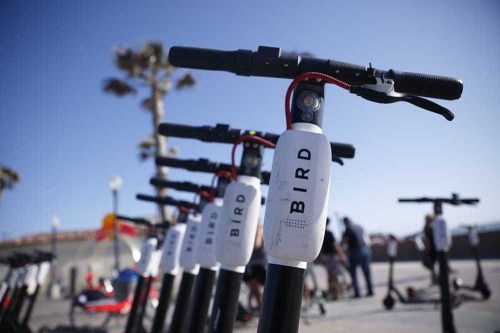College Place may soon allow electric rental scooters
Published 11:00 am Wednesday, April 7, 2021

- The Bird electric scooters that dot Pendleton will go into storage during the week of Round-Up.
COLLEGE PLACE, Wash. — The College Place City Council has the option to join bigger cities in allowing app-based electric scooters into its city limits.
So far, Pendleton and Hermiston have approved them, and Walla Walla is going through a similar process as College Place to consider the new mode of transit.
Bird, an electric vehicle sharing company dedicated to bringing affordable, environmentally friendly transportation, now in over 100 cities, approached the city about operating its scooter sharing service in College Place.
At a Tuesday, April 6, workshop, Garrett Gronowski of Bird, a Santa Monica, California, company, fielded questions from the College Place City Council.
The council will vote on the concept next week, which has already been approved by the College Place Youth Advisory Board and the Parks, Arbor, and Recreation Board. If approved, the Bird scooters would pop up in town in mid- to late May, starting with 25 in the fleet and slowly moving to 50 or more based on demand.
“Bird will have localized staff to make sure Bird scooters are placed at locations in which they are utilized the most,” City Administrator Mike Rizzitiello said. “Scooters will be taken in by Bird staff every night from 10 p.m. to 6 a.m. to their warehouse to be charged up and have maintenance performed.”
Users can find the scooters on a map through the Bird app and use the QR code on the scooter to ride them at $1 and then a per minute fee. The app requires the rider to complete a safety tutorial, according to the provided documents.
The city would not be liable for the scooters or own and maintain them.
Local staff would be responsible for repairing any broken scooters and sanitizing them for COVID-19 protocols, Gronowski said. They would also strategically place the scooters in high-demand areas within the community and move them from low-demand areas back to high-demand areas.
Gronowski fielded a question from the city’s police chief about the types of calls of service the police department would be expecting with the business.
The scooters have GPS tracking, so at all times, staff can locate them, Gronowski said.
“We do not see the administration, the police department having really any financial or operational burden,” he said.
If a Bird scooter does go missing, a plan is in place to retrieve it, and they would loop in the police department to the conversation, but the operational toll of the department should not be a heavy lift.
City administration will have access to see where the scooters are located, where the rides are starting and ending, and the trip details, he said.
Rizitiello said he imagines the electric scooters will be available around the College Avenue corridor, near the Walla Walla University campus on the city’s right of way, and around the Meadowbrook area.
Council member Melodie Selby asked if scooters are ridden on the road or the sidewalk.
Gronowski said the scooter would operate as bikes do in the bike lanes and farthest right of the road. The scooters go up to 15 mph, typical for a commuter on a bicycle, and will be parked on sidewalks out of the pedestrian right of way.
Gronowski also addressed questions about service areas.
The scooters would only run within the city limits. Once the scooter reaches outside the city limit, the scooter would beep, the rider would get a notification they’re exiting the zone, and the scooter would turn off. However, the wheels are not locked due to safety concerns. The rider could ride off with the scooter, but the location would still be traceable.
The scooters could expand to Walla Walla, if approved by the city of Walla Walla, which would allow riders to use the scooters too and from Walla Walla and College Place, he said.
“We want to be an added value to your already existing transportation network, providing that micro-mobility service,” he said.






